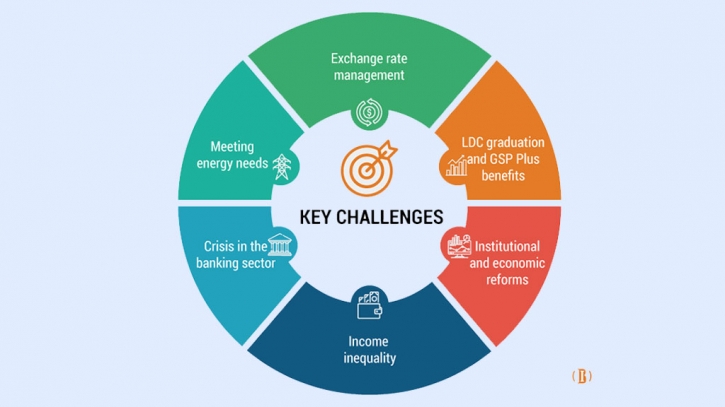Effects of ongoing economic crisis may last long, experts say at CPD seminar
BI Report || BusinessInsider

Infographic: The Business Insider Bangladesh
The adverse impacts of the ongoing economic crisis will remain in the medium-term and even in the long-term if the challenges are not addressed efficiently, experts said at a seminar on Sunday.
A group of renowned experts in their fields conveyed their observations on the country’s ongoing economic difficulties at a seminar organised by the Centre for Policy Dialogue (CPD) at its Dhanmondi office in Dhaka.
Experts said the present economic challenges have been exposed through the exchange rate, depleting foreign exchange reserves, rising inflation, and income inequality.
Later, they discussed the medium-term risks that need to be addressed before bursting. The challenges include meeting energy needs, LDC graduation and GSP Plus benefits, the crisis in the banking sector, addressing income inequality, and institutional and economic reforms.
Dr. Fahmida Khatun, executive director of CPD, delivered the address of welcome at the event. Dr. AB Mirza Azizul Islam, Dr. Salehuddin Ahmed, Dr. Hossain Zillur Rahman, Prof Mohammad Tamim, and Prof Mustafizur Rahman were among others who spoke at the seminar.
Dr. Khatun said the impacts of the current economic crisis will remain in the medium and long term. She said the IMF chief has already said that the adverse effects of the current crisis will not end before 2023.
She said the government has taken short-term measures to tackle the challenges, but these are not enough. “Only short-term measures will not work. Medium and long-term policies are needed to keep the macro and micro economy stable,” she said in her introductory speech.
The executive director of CPD said Bangladesh depends fully on imports for energy and the authorities concerned did not heed the call for gas exploration.
She also stressed the need for institutional and regulatory reforms to boost revenue collection and reduce bad loans in the banking sector.
Bring the example of Sri Lanka, Dr. Khatun said, although the position of Bangladesh is somewhat better, there is a need to be cautious and the government needs to take measures to avoid a Sri Lanka-like situation.
Dr. AB Mirza Azizul Islam, the finance adviser to a former caretaker government, said the condition of the banking sector is bad and more people have gone below the poverty line. “Income inequality has shot up and it poses a big threat to the social stability,” said Islam, also a former bureaucrat.
Dr. Salehuddin Ahmed, former governor of the Bangladesh Bank, said challenges are plenty. The country needs to address weaknesses in the markets, banks, and regulatory offices to overcome the challenges.
Prof Mustafizur Rahman, a distinguished fellow of CPD, said 10-12 percent depreciation of local currency impacted the prices and inflation. Rahman said a huge amount of capital is being flown out of the country through trade misinvoicing every year.
Economist and Chairperson of BRAC Hossain Zillur Rahman said the country has to come out from the “iron triangle frame” of one-dimensional development that brings injustice to common people. Rahman said the country’s economic management involves a “conflict of interest” that favours certain groups only.
























